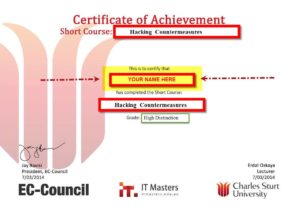
6 free online cybersecurity courses hosted by universities
6 free online cybersecurity courses hosted by universities
Originally posted at Fortune
The cybersecurity skills and talent gap are a worsening problem in the U.S.—and across the world. In fact, 80% of organizations globally have suffered one or more data breaches during the past year that the company could attribute to a lack of cybersecurity skills and/or awareness.
“The skills gap isn’t just a talent shortage challenge, but it’s also severely impacting business, making it a top concern for executive leaders worldwide,” Sandra Wheatley, senior vice president of marketing for threat intelligence and influencer communications at Fortinet, said in a statement.
If you’re looking to dip your toes into the cybersecurity world without dedicating too much time or money, many U.S. universities have free online courses that are available to anyone, even non-students. Fortune rounded up five of them to help you get your search started. All universities featured below have appeared on top graduate degree lists from Fortune, including cybersecurity, MBA, data science, and business analytics.
New York University: Introduction to Cyber Attacks
People who are interested in learning more about cybersecurity threats, vulnerability, and risks may want to check out the four-week, online course hosted by New York University. The course, Introduction to Cyber Attacks, also covers basic cybersecurity risk analysis and basic security frameworks. The next offering of the course begins on Sept. 5, 2022, and is taught by Edward G. Amoroso, a researcher and professor with NYU’s Tandon School of Engineering. Amoroso is also founder and CEO of TAG Cyber, a cybersecurity advisory and consultancy.
Stanford University: Cryptography I
University of Maryland: Hardware Security
Taught by Gang Qu, an associate professor of electrical and computer engineering, Hardware Security also covers the notion that security stems from hardware design and teaches students how to use tools to strengthen and secure hardware. The class takes about 12 hours to complete over seven weeks. Students who enroll in the cybersecurity specialization program can earn a certificate upon completion.
University of Michigan: Internet History, Technology, and Security
At the University of Michigan, students can enroll in Internet History, Technology, and Security, which offers an overview of the basics of network technology and how the internet impacts our lives, culture, and society. The course also covers the beginning of the Internet, including how it was made, who made it, and how it works. Other course topics include Internet commercialization and growth and transport control protocol.
During the last two weeks of the 10-week course, students also learn about web security and encrypting to better protect data. Charles Russell Severance, a clinical professor at the University of Michigan School of Information, teaches the course, which takes a total of about 15 hours to complete.
Western Governors University: Network and Security Foundations
Western Governors University is ranked by Fortune as having one of the top online cybersecurity master’s programs in the U.S. Network and Security Foundations covers the components of computer networks and basic security concepts associated with networks. In this intro-level course, students also get an introduction to network security, threat, risk mitigation, and security management concepts and practices.
The course is taught by Gerri Light, program chair of WGU’s College of IT, and Michelle Watt, a WGU instructor. The self-paced course takes up to 10 hours each week to complete over an eight-week period. WGU also offers an unlimited-access version of the course for $166.08, which allows students to review materials after the course ends. Otherwise, students can complete the course for free with limited access to materials just during the enrollment period.
See how the schools you’re considering fared in Fortune’s rankings of the best master’s degree programs in data science (in-person and online), nursing, computer science, cybersecurity, psychology, public health, and business analytics, as well as the doctorate in education programs MBA programs (part-time, executive, full-time, and online).
Charles Sturt University: Free Short Courses

This is my addition to the list to Fortune Magazine’s list.
Upskilling. Reskilling. Lifelong learning. In today’s world, professional progress is built on continuously developing your skill set. Whether you want to progress in your current industry or shift direction – we’ll have a course to get your there.
Choose from micro-credentials to boost your employability skills, and short courses that give you the knowledge to face tomorrow’s challenges. Plus, if you want to take your study further, you can build to a full qualification at your own pace.
If you are considering enrolling in one of our unique Master degrees, why not ‘try before you enrol’?
Enrolling in these webinar-based free short courses allows insight into how we create a collaborative learning environment, and is also an opportunity to engage with other students and build networks.
Passing course exams will earn you a certificate of achievement, and may even qualify you for credit – successfully complete 3 or more short courses and be eligible for 1 industry elective credit.
Get more info here. You can also read more here in my blog about this
You can also watch some of the courses I delivered in YouTube with out signing up to any “web site”. Here is a sample :
free online cybersecurity courses




